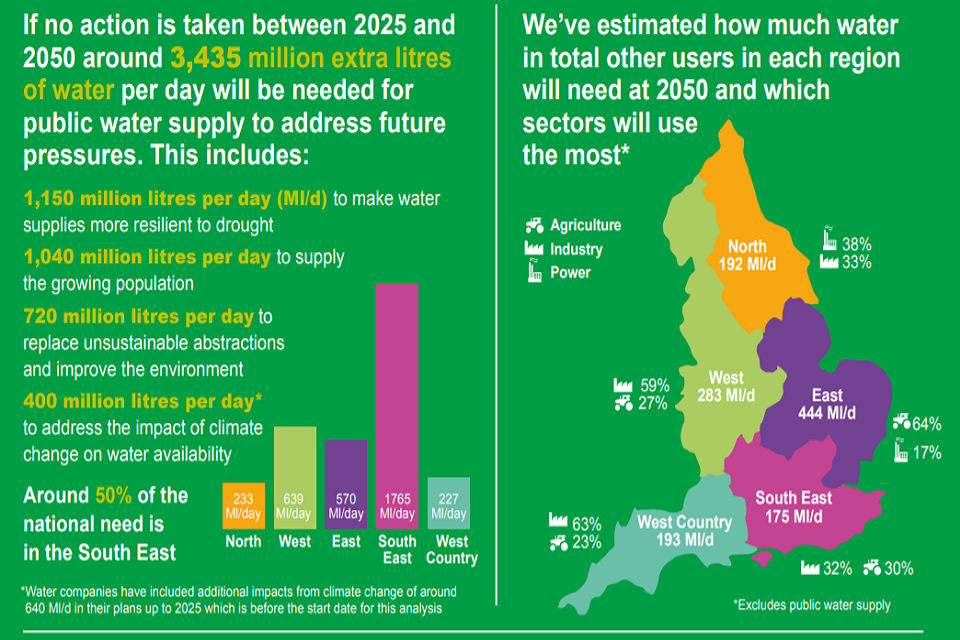A NEW plan of action between the government and industry partners seeks to tackle the future threats to the UK water supply.
The National Framework for Water Resources was launched today by the Environment Agency, bringing together industry partners, regulators and the government.
The framework will help reduce demand, halve leakage rates, develop new supplies, move water to where it’s needed and reduce the need for drought measures that can harm the environment.
Dame Kate Barker of the National Infrastructure Commission, commented on the news: “With demand for water growing and the stability of supply under challenge from climate change, we need a coherent long term plan that ensures England’s water system is resilient to drought while continuing to provide a reliable supply to families and businesses.
“We welcome this framework’s bold vision, in line with the conclusions in our National Infrastructure Assessment.
“It is clear about the need to protect our natural environment and promotes collaboration between water companies, regulators, government and major users to reduce demand, increase supply and better share scarce water resources.”
The latest predictions estimate that if further action is not taken, between 2025 and 2050 we’ll need more than 3.4 billion additional litres of water per day to meet future demand for public water supply.
The framework looks to ease the pressure on our future water supplies by:
- Reducing demand to an average of 110 litres per person per day by 2050
- Improving water efficiency across all sectors
- Working with water companies to halve leakage rates by 2050
- Developing new supplies such as reservoirs, water re-use schemes and desalination plants
- Making it easier to move water to where it’s needed through regional water transfers
- Reducing the use of drought measures that can impact the environment
The framework introduces an ambitious aim for water companies to help consumers cut wastage and to use water more wisely in order to reduce our average water use from 143 to 110 litres per day.
Emma Howard Boyd, Chair of the Environment Agency, commented: “If we don’t take action many areas of England will face water shortages by 2050.
“The National Framework for Water Resources is the step change required to ensure the needs of all water users are brought together to better manage and share resources.
“Collaboration is key if we are going to deliver the resilience and environmental enhancement we need.”
Five regional groups across the country will work up plans tailored to the specific needs of their individual area, bringing together the 17 English water companies, industry regulators, government and other water users.
The framework will guide these groups and deliver a national blueprint for future water resources planning from 2025 to 2050 and beyond.
Rob Light, Chair of the Consumer Council for Water, said: “We hope the framework will be a catalyst for the whole sector to unify its efforts in tackling one of the most urgent consumer and environmental challenges of our time – safeguarding the future of our water resources.
“It’s great we now have a clear plan in place but people will judge the sector on its actions.
“Consumers want a safe, reliable supply of water but they also expect water companies to be good stewards of our rivers, streams and natural environment which also depend on there being enough water to survive.
“All of us have a part to play in the way we use water, but it’s vital we help consumers understand the scale of the problem and the steps that will need to be taken if we want them to be part of the solution.”
The framework also sets out the challenges that water-intensive industries such as agriculture and power generation are likely to face across different parts of the country as a result of climate change, and how we can overcome them.
It also sets a greater level of ambition for restoring, protecting and improving the environment that is the source of all our supplies.
David Black, Senior Director at Ofwat, added: “We are acutely aware of the need to secure sustainable long term supply solutions and to reduce the demand for water, which is why we are allowing up to £469 million to help companies work together on solving long-term drought resilience challenges.
“This provides companies with the resources they need to explore a selection of robust and practical solutions such as building reservoirs, and moving water from the wetter north to the drier south – whilst pushing companies to cut down on leakage.
“We will work with the Environment Agency to drive collaboration between industry, regulators and government so that we can all play a part in securing affordable, reliable water services whilst alleviating pressure on the environment and adapting to climate change.”
You can access the full framework document and summary here.
